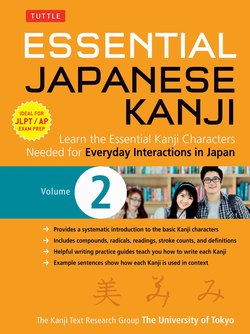Читать книгу Essential Japanese Kanji Volume 2 - University of Tokyo Kanji Research Group - Страница 12
На сайте Литреса книга снята с продажи.
ОглавлениеLESSON 2
Homestay
ホームステイ
When you come to study in Japan for a while, a homestay is a good way to get to know the daily customs of Japanese life, as well as everyday life and special events in that particular area of the country. You may talk with the neighbors, the family’s relatives and their friends, and better understand how the Japanese relate to each other. Taking a trip with your host family is another great opportunity to learn. And, as a homestay provides you with the basic essentials like furniture, you won’t have to buy those for yourself. If you would like to set up a homestay, you can consult with the university or company you’re affiliated with. In this lesson, you will learn terminology related to homestays and host parents.
1 Introductory Quiz
Look at the illustrations on page 22 and refer to the words in Vocabulary. Then try the following quiz.
You received this letter from your friend who lives with a Japanese host family.
Which are the correct contents of the letter? Write ○ (correct) or × (wrong) in the spaces provided.
2 Vocabulary
Study the readings and meanings of these words to help you understand the Introductory Quiz.
3 New Characters
Fourteen characters are introduced in this lesson. Use the explanations to help you understand and remember the characters. Study the compound words to increase your vocabulary.
遠 父 母 働 親 相 太 登 録 犬 近 集 短 皆
13
遠
tō-i, en
とお・い、エン far
The loose way to go to the destination is a longer way to go. Thus 遠 means far.
| 遠い | とおい | tōi | far |
| -------- | |||
| 遠回し | とおまわし | tōmawashi | indirect |
| 遠回り | とおまわり | tōmawari | roundabout way |
| 遠近法 | えんきんほう | enkinhō | law of perspective |
| 遠来 | えんらい | enrai | from afar |
| 遠方 | えんぽう | empō | afar |
14
父
chichi, fu
ちち、フ father
As mature men in the family were traditionally responsible for wood cutting, a hand 乂 with an ax signifies father.
| お父さん | *おとうさん | otō san | father (polite) |
| 父 | ちち | chichi | father |
| 父母会 | ふぼかい | fubokai | parents’ association |
| -------- | |||
| 義父 | ぎふ | gifu | father-in-law |
| 父上 | ちちうえ | chichiue | father (polite) |
| 父方 | ちちかた | chichikata | paternal |
15
母
haha, bo
はは、ボ mother
A human figure with pronounced breasts suggests nursing; thus this kanji means mother.
| お母さん | *おかあさん | okā san | mother (polite) |
| 母 | はは | haha | mother |
| 父母 | ふぼ | fubo | father and mother; parents |
| -------- | |||
| 母国 | ぼこく | bokoku | mother land |
| 母国語 | ぼこくご | bokokugo | mother tongue |
| 生母 | せいぼ | seibo | one’s real mother |
| 母上 | ははうえ | hahaue | mother (polite) |
| 母方 | ははかた | hahakata | maternal |
16
働
hatara-ku, dō
はたら・く、ドウ work
働 combines a man イ, heavy 重, and power 力, suggesting a man working, moving heavy things.
| 働く | はたらく | hataraku | to work |
| 労働者 | ろうどうしゃ | rōdōsha | worker |
| -------- | |||
| 働き口 | はたらきぐち | hatarakiguchi | job |
| 働き者 | はたらきもの | hatarakimono | hard worker |
| 働き手 | はたらきて | hatarakite | worker |
17
親
oya, shin
おや、シン parent
Parents 親 stand 立 on a tree 木 and watch 見 the children.
